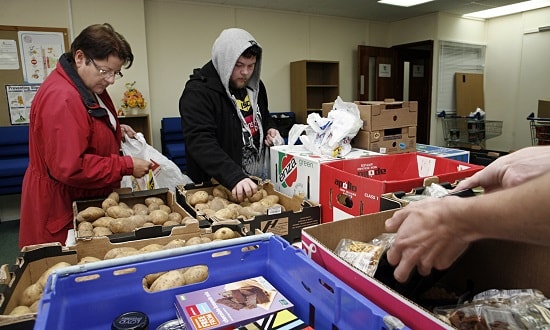
Image: food bank in Hull (photo: Gary Calton)
A report released in November 2019 by the Trussell Trust presents the most extensive research ever into hunger and food bank usage in Britain. State of Hunger lists irrefutable fact after fact and hard-hitting statement after statement which shine a light on the harrowing reality facing millions of working class people in this country as their conditions of life drastically deteriorate.
Food bank usage in Britain reached a record high between April and September 2019, with 823,145 three-day emergency food parcels given to people – almost 5,000 a day, with more than a third going to children. This is a 23% increase on the same period in 2018, and represents the sharpest annual increase in five years. Over the last five years, the number of emergency food parcels provided by Trussell Trust food banks has increased by 73%. In the 12 months to March 2019, over half a million emergency food parcels went to children. As of June 2019, there were an estimated 2,070 food banks in Britain. They distributed an estimated three million emergency food parcels in 2018/19.
Between 2016 and 2018, no fewer than 8-10% of households in Britain were food insecure. The official relative poverty threshold after paying rent in 2017/18 was an income of £262 per week. Food bank users fall drastically short of this with an average £50 a week to live on after paying rent – a mere 11% of the national average of £437. This is an extremely impoverished section of the population.
Benefit system designed to create starvation
The research found that reduction and delays in benefit payments that have been designed into the benefit system were the biggest drivers in food bank usage. These drivers include ‘the five-week wait for the first Universal Credit payment, benefit sanctions, changes to eligibility for health-related benefits, the benefit cap, “bedroom tax” and, last but not least, the rules around how much benefit could be deducted to repay debts or advances.’ Other benefit changes such as the Personal Independence Payment assessments, (ie being denied disability benefits by government-directed quacks), also had ‘sizeable and significant effects’ on food bank usage.
People using food banks have household incomes about the same as housing costs, with 20% reporting no income at all in the month before being referred to a food bank. Meagre benefit payments ensnare people into precariously living below or just above the destitution level, so any kind of reduction in benefit from a sanction or loan repayment for instance, tips them over the edge very easily and very quickly. They have no money to pay for food, to heat or light their homes, for appropriate clothing, footwear or basic toiletries, and many are homeless. 94% of food bank users are in this state of destitution.
Being forced into using a food bank is not a blip in people’s lives: for the majority it is a reflection of longterm poverty and financial struggle that they have little hope of escaping. 49% of people reported having been in financial hardship for an extended period or even all of their lives, and 21% reported cyclical poverty, in other words being constantly in and out of hunger and being trapped in this brutal loop.
What this all adds up to is working class people, in one of the richest countries on the planet, being purposely and relentlessly starved. People who use foodbanks report that they cannot function in their day to day lives, constantly feeling dizzy and tired. Parents, usually mothers, miss meals sometimes for days at a time in order to feed their children. When their children realise what is happening, they pretend they aren’t hungry so that they can protect their mothers and end up fainting from hunger themselves. Parents cannot buy fresh fruit and vegetables because they are too expensive. This has a knock-on effect on physical and mental health: low self-esteem and a feeling of being a failure. There is also a detrimental impact on children’s educational, social and physical development which has repercussions later in life.
Hunger, homelessness, poverty and isolation are all endemic failures and inherent features of this rapacious capitalist system that we are forced to live under. It requires large numbers of people to be unemployed or in temporary employment. It requires people to work harder for less pay, in some cases longer hours and in many cases fewer hours than they need. Around one in seven households using foodbanks had someone in employment, typically part-time. Between July and September 2019, 3.2 million people were underemployed: they wanted more hours but were not given them. This system needs to keep people in a state of hunger so that the rich can gorge themselves on luxury and excess. It needs to be brought to an end.
Mark Moncada
Fight Racism! Fight Imperialism! 273 December 2019/January 2020




